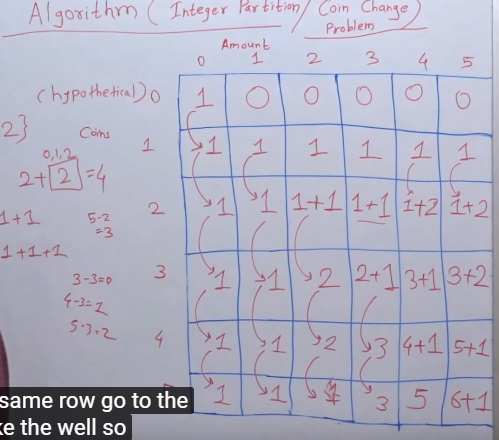整数拆分-dp问题
Integer Partition
In number theory and combinatorics, a partition of a positive integer n, also called an integer partition, is a way of writing nas a sum of positive integers.
Two sums that differ only in the order of their summands are considered the same partition. For example, 4 can be partitioned in five distinct ways:
4
3 + 1
2 + 2
2 + 1 + 1
1 + 1 + 1 + 1
The order-dependent composition 1 + 3 is the same partition as 3 + 1, while the two distinct compositions 1 + 2 + 1 and 1 + 1 + 2 represent the same partition 2 + 1 + 1.
input:4
output:5
思路:
1.不考虑新加入的数,达到总和N的的种数n1
2.考虑新加入的数,达到总和N的的种数n2
3.output=n1+n2

代码:
/** * @param {number} number * @return {number} */ export default function integerPartition(number) { // Create partition matrix for solving this task using Dynamic Programming. const partitionMatrix = Array(number + 1).fill(null).map(() => { return Array(number + 1).fill(null); }); for (let numberIndex = 1; numberIndex <= number; numberIndex += 1) { partitionMatrix[0][numberIndex] = 0; } for (let summandIndex = 0; summandIndex <= number; summandIndex += 1) { partitionMatrix[summandIndex][0] = 1; } // Now let's go through other possible options of how we could form number m out of // summands 0, 1, ..., m using Dynamic Programming approach. for (let summandIndex = 1; summandIndex <= number; summandIndex += 1) {//行-被加数 for (let numberIndex = 1; numberIndex <= number; numberIndex += 1) {//input代表的列 if (summandIndex > numberIndex) { // If summand number is bigger then current number itself then just it won't add // any new ways of forming the number. Thus we may just copy the number from row above. partitionMatrix[summandIndex][numberIndex] = partitionMatrix[summandIndex - 1][numberIndex]; } else { /* * The number of combinations would equal to number of combinations of forming the same * number but WITHOUT current summand number PLUS number of combinations of forming the * <current number - current summand> number but WITH current summand. * * Example: * Number of ways to form 5 using summands {0, 1, 2} would equal the SUM of: * - number of ways to form 5 using summands {0, 1} (we've excluded summand 2) * - number of ways to form 3 (because 5 - 2 = 3) using summands {0, 1, 2} * (we've included summand 2) */ const combosWithoutSummand = partitionMatrix[summandIndex - 1][numberIndex]; const combosWithSummand = partitionMatrix[summandIndex][numberIndex - summandIndex]; partitionMatrix[summandIndex][numberIndex] = combosWithoutSummand + combosWithSummand; } } } return partitionMatrix[number][number]; }


